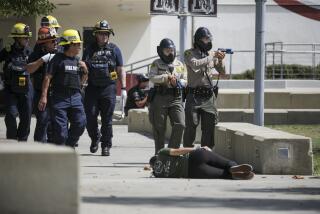Tighter Rules for Teacher Arrests
Gov. Gray Davis has signed a bill that directs law enforcement agencies and the state’s teacher credentialing board to notify public and private schools when teachers are arrested on suspicion of certain sex or drug crimes -- closing two loopholes that were exposed when an Orange County teacher and coach was arrested a second time in two years on similar drug charges.
The legislation, unopposed in the state Assembly and Senate, takes effect Jan. 1. It was signed by Davis on Friday along with a number of other education bills, capping a crusade launched early this year by Brea Assemblywoman Lynn Daucher, a former teacher, after she learned of the arrest of a teacher in her own district.
“It was pretty much a slam dunk,” said Daucher, a Republican. “Everyone was very sympathetic with the bill, and the circumstances, and thought they [the loopholes] need to be fixed.”
Daucher introduced the bill, AB 608, after the April arrest of Jon Noel Looney, a longtime industrial-arts teacher and former varsity football coach at Brea Olinda High School. He was charged with possessing methamphetamine and marijuana, driving under the influence of methamphetamine, and other drug-related offenses.
According to Buena Park police, Looney was spotted driving erratically in the parking lot of a motel known for drug activity, then sped away at 100 mph. As officers followed, he ran a red light and tossed a bag of marijuana onto the road, police said.
Looney had been arrested on similar drug charges in 2001. But Brea Olinda officials didn’t know about it -- and therefore could take no disciplinary action -- because of clashes between competing penal codes, one designed to keep criminals out of classrooms and another aimed at rewarding addicts who kick their habits.
Under current law, most police agencies are required to report the arrests of teachers to local school districts -- which under many circumstances can suspend and fire them -- and the state Department of Justice. The Justice Department reports the cases to the California Teacher Credentialing Commission, which can suspend the credentials of accused teachers.
But in Looney’s case, the arresting agency the first time around was the California Highway Patrol, which generally reports teacher arrests only to the state.
And even though the credentialing commission was aware of the arrest, the agency was prohibited from taking action or passing the information on to the school district.
This is because Looney entered a deferred plea, in which he agreed to undergo a 32-hour drug program in exchange for dismissal of the charges. Under current law, the commission is prohibited from taking action under those circumstances.
Under the new law, the CHP and the teachers commission are required to notify school officials, by telephone and in writing, of any teacher’s arrests on misdemeanor sex or drug possession charges.
“We think that anything that strengthens the notification requirements for teachers who have been arrested for serious offenses is good for the safety of the children in the classroom,” said Mary Armstrong, general counsel for the teachers commission.
“We couldn’t give immediate notice of an arrest to a school district. Now we can without any problem.”
Looney, who taught industrial arts in the Brea Olinda Unified School District for 17 years and was head varsity coach at Brea Olinda High School for 14 years, was placed on unpaid leave after his second arrest.
He was sentenced in June to another one-year drug rehabilitation program after pleading guilty to multiple drug charges.
More to Read
Sign up for Essential California
The most important California stories and recommendations in your inbox every morning.
You may occasionally receive promotional content from the Los Angeles Times.









